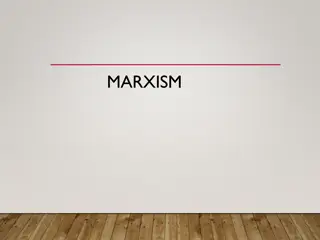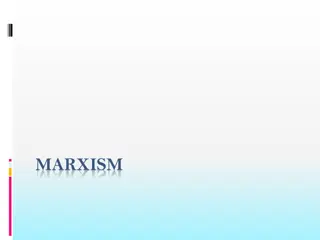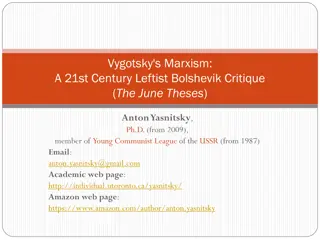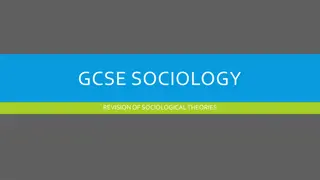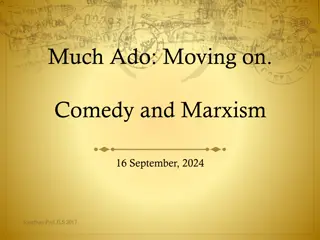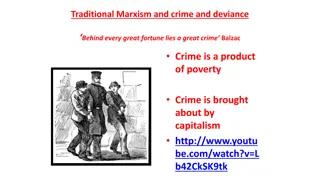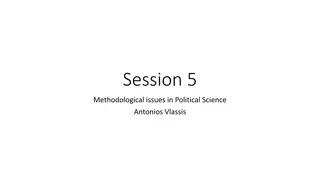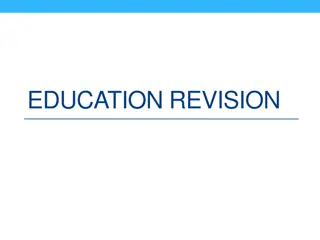Understanding Marxism: Principles and Theories Explored
Marxism is a theoretical system developed from the writings of Karl Marx, emphasizing historical materialism, dialectical materialism, theory of surplus value, theory of alienation, and more. It posits that societal structures are determined by economic conditions and that progress evolves through d
0 views • 15 slides
Understanding Marxism and Capitalism
Marxism is a body of social, political, and economic thought derived from the works of Karl Marx and Friedrich Engels, focusing on the analysis of capitalism. Capitalism is an economic system where private individuals own goods and services based on market supply and demand. The purest form of capit
0 views • 25 slides
Understanding Sociological Theories and Frameworks
Sociological theories, encompassing micro and macro perspectives, provide a lens to interpret societal dynamics. Consensus theories like functionalism emphasize shared norms, while conflict theories such as Marxism highlight social inequalities. Social action theories like interactionism focus on in
3 views • 21 slides
Vygotsky's Marxism in the 21st Century: A Critical Analysis by Anton Yasnitsky, Ph.D.
Anton Yasnitsky, Ph.D., a member of the Young Communist League of the USSR, presents a critical analysis of Vygotsky's Marxism in the 21st century. The three-volume research project explores Vygotsky's legacy and impact on psychology, challenging existing interpretations and offering new insights. T
0 views • 37 slides
Exploring Religious Beliefs and Social Dynamics in SCLY3: Functionalism vs. Marxism
Delve into the intricate relationship between religious beliefs and social change or stability through the contrasting lenses of Functionalism and Marxism. Unpack the mechanisms by which belief systems impact societal structures and the dynamics of change or preservation. Gain insight into how these
1 views • 58 slides
Understanding Sociological Theories for GCSE Sociology Revision
Explore key sociological theories including Marxism, Functionalism, Feminism, and Interactionism. Understand how these theories interpret society and influence social dynamics. Engage in interactive activities like the Gingerbread Theory to apply concepts creatively. Discover main key studies by sch
0 views • 5 slides
Exploring Comedy and Marxism in Much Ado About Nothing
Delve into the intricate themes of comedy and Marxism as portrayed in Shakespeare's play Much Ado About Nothing. Discover the characters, their relationships, and the central plot elements that drive this classic comedy forward, alongside a critical analysis of the genre's effect and its historical
0 views • 26 slides
Understanding Communism, Marxism-Leninism, and Socialism Through Visuals
Explore the concepts of communism, Marxism-Leninism, and socialism through images and definitions. Learn about different economic systems and key figures like Leon Trotsky, Che Guevara, and Fidel Castro, and consider why they are idolized by young Iranian children.
0 views • 11 slides
Marxist Perspectives on Crime and Law Enforcement
Traditional Marxism views crime as a product of poverty and capitalism, emphasizing the manipulation of values by the powerful to maintain control. Marxism challenges the idea that law reflects the will of the people, arguing that it serves the interests of the ruling class by passing and enforcing
0 views • 19 slides
Understanding Classical Marxism: Key Concepts and Critiques
Marxism, rooted in the ideas of Karl Marx, emphasizes the significance of economic relations in shaping social and political structures. Classical Marxism focuses on economism, determinism, materialism, and structuralism, viewing history through a lens of class struggle and offering an emancipatory
0 views • 21 slides
Exploring Role and Purpose in Education: Insights into Functionalism, New Right, and Marxism
Delve into the various perspectives on education's role and purpose through the lenses of Functionalism, New Right, and Marxism. Uncover the differences in achievement between social groups, analyze external and internal factors influencing education, and explore educational policies. Criticisms, so
0 views • 36 slides
